This is an interview with Darryl Macdonald, Executive Director of the Palm Springs International Film Society about Palm Springs ShortFest 2007. Darryl  produces both the Palm Springs International Film Festival and the Palm Springs International Festival of Short Films.
produces both the Palm Springs International Film Festival and the Palm Springs International Festival of Short Films.
Bijan Tehrani: Congratulations for the great ShortFest 2007. How successful festival was for you? Do you think you have achieved the goals you had in mind?
Darryl Macdonald: This year’s Festival was hugely gratifying. Attendance took a major jump across the board – audiences, filmmakers and industry came to the Festival in record numbers and the Film Market hit new highs in activity, with deals being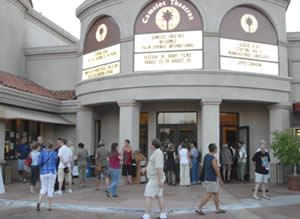 made on a daily basis. Statistically, we surpassed all our projections for the 2007 Festival and Market, and the Box Office took a 22% jump over last year. But the ultimate measure of the Festival’s success was evinced through the acclaim heaped upon the films and the filmmakers by audiences and by the press and industry who covered the event. Film after film met with a rapturous response, and the word of mouth emanating after the screenings was sensational. The filmmakers who attended (at least 350 directors, producers, writers, actors, etc. at last count) brought such great energy to the event – and seemed genuinely thrilled with every aspect of the Festival and Marketplace – that their enthusiasm was infectious, permeating the atmosphere of the event for everyone in attendance. I can’t imagine that things could have turned out any better than they did – it would be hard to top this year’s event for sheer, unbridled film mania.
made on a daily basis. Statistically, we surpassed all our projections for the 2007 Festival and Market, and the Box Office took a 22% jump over last year. But the ultimate measure of the Festival’s success was evinced through the acclaim heaped upon the films and the filmmakers by audiences and by the press and industry who covered the event. Film after film met with a rapturous response, and the word of mouth emanating after the screenings was sensational. The filmmakers who attended (at least 350 directors, producers, writers, actors, etc. at last count) brought such great energy to the event – and seemed genuinely thrilled with every aspect of the Festival and Marketplace – that their enthusiasm was infectious, permeating the atmosphere of the event for everyone in attendance. I can’t imagine that things could have turned out any better than they did – it would be hard to top this year’s event for sheer, unbridled film mania.
 Bijan: Were screenings welcomed by the audience and how was the interaction of the audience with films and filmmakers?
Bijan: Were screenings welcomed by the audience and how was the interaction of the audience with films and filmmakers?
Darryl: We have both the empirical evidence of reactions at the screenings and the buzz on the street to go by, where the audience response is concerned: they truly loved both the films in the Festival line up and the filmmakers who attended and took part in Q&A;’s at the screenings. I’ve never experienced so much positive feedback for a film line up at any festival I’ve attended or been involved in, and the rest of the Festival staff feels the same. It’s especially gratifying when audience members are constantly praising the event and its films to staff at the theatres while the Festival is going on – but the praise didn’t let up for a second from beginning to end this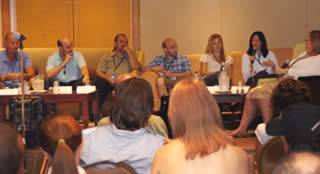 year. It’s still going on, even now that it’s over. Yesterday we presented the annual “Best of the Fest” day screenings, based on Audience balloting throughout the Festival; again, we had record attendance and every short that screened during the day met with rapturous applause from the audiences who filled the theatres.
year. It’s still going on, even now that it’s over. Yesterday we presented the annual “Best of the Fest” day screenings, based on Audience balloting throughout the Festival; again, we had record attendance and every short that screened during the day met with rapturous applause from the audiences who filled the theatres.
Bijan: An amazing fact was the presence of such a large number of the filmmakers at the festival. How do you explain that? Specially that there were a good number of international filmmakers flying in to Palm Springs just for the festival.
 Darryl: The positive buzz about this Festival on the festival circuit and among short filmmakers just keeps growing from year to year. In recent years in particular, large numbers of filmmakers have come in from all over the world for the event – from France, Germany, Australia and New Zealand, Switzerland, Canada, Japan, Italy and Spain, among other countries. This year, we had 14 filmmakers from the U.K. alone. I guess the reason why they come is best illustrated by a young German filmmaker who came by our offices yesterday, just to say a final personal thanks to all of the staff of the Festival. She said that another German short filmmaker who she had met last year (and who participated in the 2006 Palm Springs ShortFest with her film “Exploding Buds”) had told her “You have to submit your film to Palm Springs, and if it’s selected, you have to go there for the event. It’s the best short film festival you could ever imagine, and you’ll have a wonderful time while you’re there”. For me, that says it all.
Darryl: The positive buzz about this Festival on the festival circuit and among short filmmakers just keeps growing from year to year. In recent years in particular, large numbers of filmmakers have come in from all over the world for the event – from France, Germany, Australia and New Zealand, Switzerland, Canada, Japan, Italy and Spain, among other countries. This year, we had 14 filmmakers from the U.K. alone. I guess the reason why they come is best illustrated by a young German filmmaker who came by our offices yesterday, just to say a final personal thanks to all of the staff of the Festival. She said that another German short filmmaker who she had met last year (and who participated in the 2006 Palm Springs ShortFest with her film “Exploding Buds”) had told her “You have to submit your film to Palm Springs, and if it’s selected, you have to go there for the event. It’s the best short film festival you could ever imagine, and you’ll have a wonderful time while you’re there”. For me, that says it all.
Bijan: How did other events of the festival go? Were there filmmakers attending panels and workshops?
Darryl: The panels were a particular hit with filmmakers attending the Festival this year – highlights included our Master Classes with director John Dahl and animator Bill Plympton, and seminars like the program revolving around new markets and opportunities for short filmmakers (“The Sexy Stuff: iTunes, Cellphones and Internet Opportunities”) and the panel with programmers from the festival circuit giving the inside scoop on the selection process. They were hugely appreciated by the filmmakers who attended this year’s Festival as well as the industry, press and regular filmgoers who participated and covered them. We owe a major debt of thanks to Kim Adelman, who put together a great slate of special programs and workshops this year, and worked hard in getting the right industry talent to participate.
animator Bill Plympton, and seminars like the program revolving around new markets and opportunities for short filmmakers (“The Sexy Stuff: iTunes, Cellphones and Internet Opportunities”) and the panel with programmers from the festival circuit giving the inside scoop on the selection process. They were hugely appreciated by the filmmakers who attended this year’s Festival as well as the industry, press and regular filmgoers who participated and covered them. We owe a major debt of thanks to Kim Adelman, who put together a great slate of special programs and workshops this year, and worked hard in getting the right industry talent to participate.
Bijan: At Cinema Without Borders we believe that after a few decades we have started to see new movements and exciting experiments in American cinema through short films made by young film directors. Do you agree with us and how do you feel about it?
 Darryl: I absolutely agree, and I think that we’re at point in the scheme of things when short films will begin to have an even more profound influence and effect on the techniques, topics and filmmaking styles used for feature films. The crops of filmmakers that this Festival brought together are incredibly innovative and talented – I have no doubt that a number of them will go on to be major voices in the cinema of this century. Across the board – from the live action short films to the animated and documentary films that were showcased here – you truly got a sense of new voices and new visions – a fresh approach to storytelling that captivated audiences and gave them a new sense of the possibilities of film to illuminate and entertain in equal measure. This can only mean good things for the future of the cinema, and as audiences respond to that stimulus and support short films through all of the platforms available to enjoy them – from theatrical venues like festivals to new web and cellphone outlets, studios and producers will take note, and I believe we’ll see a change in conventional attitudes towards what audiences want. That is the most powerful effect that today’s short filmmaking can have on the world of film, and I think that we’re on the cusp of something great where short filmmaking is concerned.
Darryl: I absolutely agree, and I think that we’re at point in the scheme of things when short films will begin to have an even more profound influence and effect on the techniques, topics and filmmaking styles used for feature films. The crops of filmmakers that this Festival brought together are incredibly innovative and talented – I have no doubt that a number of them will go on to be major voices in the cinema of this century. Across the board – from the live action short films to the animated and documentary films that were showcased here – you truly got a sense of new voices and new visions – a fresh approach to storytelling that captivated audiences and gave them a new sense of the possibilities of film to illuminate and entertain in equal measure. This can only mean good things for the future of the cinema, and as audiences respond to that stimulus and support short films through all of the platforms available to enjoy them – from theatrical venues like festivals to new web and cellphone outlets, studios and producers will take note, and I believe we’ll see a change in conventional attitudes towards what audiences want. That is the most powerful effect that today’s short filmmaking can have on the world of film, and I think that we’re on the cusp of something great where short filmmaking is concerned.
Bijan: How do you see the future of the Palm Springs ShortFest?
Darryl: No doubt we’ll be expanding the venues for next year’s Festival to keep up with the growing demand from audiences. I also expect the Film Market to grow in equal measure. But if I had one wish for the future of this Festival, it is that we can maintain the Festival’s our user-friendly and intimate atmosphere, even as we go through the inevitable growth in programs and participation that is spurred on by the kind of success we enjoyed with this year’s event.
JURY AWARDS
BEST OF FESTIVAL AWARD– $2,000 & Showbiz Software Package. The winner of this award is eligible to submit their film to the Academy of Motion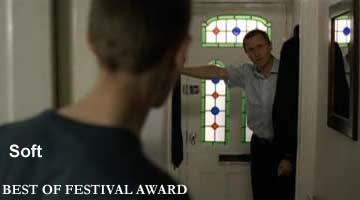 Picture Arts and Sciences for Oscar consideration.
Picture Arts and Sciences for Oscar consideration.
Soft (UK), Simon Ellis
A weak father encounters a gang of teenage thugs in this frighteningly realistic take on violence that deftly blends emotional complexity with a keen understanding of the darker side of youth culture.
FUTURE FILMMAKER AWARD – $2,000 & Showbiz Software Package
Dee Rees, Pariah (USA)
Winner of the L. A. OutFest Audience Prize for Best Short Film, Pariah tells the story of a 17-year-old black student who is grappling with the conflicting pressures placed upon her by her 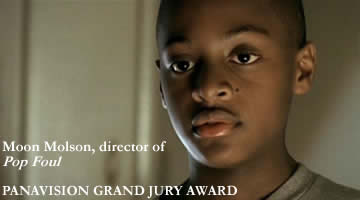 family, her schoolmates and her best friend, an ‘out’ butch lesbian who chides her for trying to hide her sexuality.
family, her schoolmates and her best friend, an ‘out’ butch lesbian who chides her for trying to hide her sexuality.
PANAVISION GRAND JURY AWARD – Panavision Camera Package valued at $60,000 & two days studio time courtesy of Casablanca Studios, Palm Springs, CA
Moon Molson, Pop Foul (USA)
This Student Academy Award-winning short film relates the ways in which the sins of a father manifest themselves in tragic and unexpected ways on a child.
AUDIENCE AWARDS (TO BE ANNOUNCED AT THE THEATRE)
All first place winners in these categories will receive a Showbiz Software package.
AUDIENCE FAVORITE LIVE ACTION SHORT
I Hate Musicals (USA), Stewart Schill – Brad, a heartless insurance executive, has to learn to love Musicals if he’s to save his relationship with his lovely fiancée Melissa.
AUDIENCE FAVORITE DOCUMENTARY SHORT
Freeheld (USA), Cynthia Wade – Laurel Hester, a policewoman with 25 years of service on the Ocean County police force, faces a form of discrimination that confronts too many people in contemporary America. This incredibly moving documentary draws attention to the issue of domestic partnership benefits for same-sex couples in a way that no mere newspaper story could ever do.
AUDIENCE FAVORITE ANIMATION SHORT
The Needful Head (USA), Zeth Willie – Fed up with his lack of control over the things that come out of his mouth, a ghoulish character decides that the best solution is to simply get rid of it, in this twisted animated story about what can happen when you lose your head
JURY CATEGORY AWARDS
All first place winners in these categories received a cash award of $2,000, Showbiz Software Package. First place winners in the Animated and Live Action categories will be eligible to submit their films to the Academy of Motion Picture Arts & Sciences for Oscar consideration. Second Place recipients received a $500 cash prize.
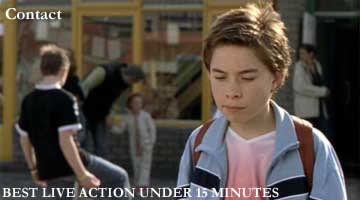 BEST LIVE ACTION UNDER 15 MINUTES
BEST LIVE ACTION UNDER 15 MINUTES
First Place ($2,000) – Contact/Raak (Netherlands), Hanro Smitsman
Everything happens for a reason, and bad things come full circle – two lessons underlined to fascinating effect in this cautionary tale of a bad day in the lives of a number of people whose fates are interconnected by circumstance and chance.
Second Place ($500) – Offside (Israel), Erez Tadmor &Guy; Nattiv
BEST LIVE ACTION OVER 15 MINUTES:
First Place ($2,000) – The Tonto Woman (UK/Spain), Daniel Barber
Based on a short story by Elmore Leonard, this brilliant film recounts the fateful meeting of a cattle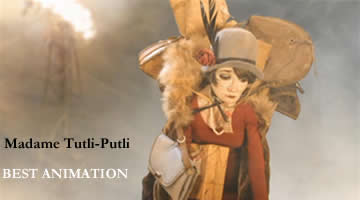 rustler and a singular woman on the harsh frontier of the American West during a time when virtue and vice were relative values, depending upon the circumstances.
rustler and a singular woman on the harsh frontier of the American West during a time when virtue and vice were relative values, depending upon the circumstances.
Second Place ($500) Deface (USA), John Arlotto
BEST ANIMATION:
First Place ($2,000) – Madame Tutli-Putli (Canada), Chris Lavis, Maciek Szczerbowski
Madam Tutli-Putli boards the night train and finds herself drawn into a desperate metaphysical adventure with an undertow of mystery and suspense.
Second Place ($500) – Love at First Sight (De la Vista Nace el Amor) (Mexico), Miguel Anaya
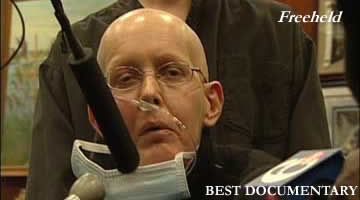 BEST DOCUMENTARY:
BEST DOCUMENTARY:
First Place ($2,000) – Freeheld (USA), Cynthia Wade
Laurel Hester, a policewoman with 25 years of service on the Ocean County police force, faces a form of discrimination that confronts too many people in contemporary America. This incredibly moving documentary draws attention to the issue of domestic partnership benefits for same-sex couples in a way that no mere newspaper story could ever do.
Second Place ($500) – Salim Baba (India), Tim Sternberg
STUDENT CATEGORIES
All first place winners in these categories will receive $1,000 in Kodak film stock. Second Place recipients receive $500 in Kodak film stock. All student filmmakers in Festival competition are eligible for these awards.
BEST STUDENT LIVE ACTION UNDER 15 MINUTES:
First Place – Clear Cut, Simple (USA), Vineet Dewan
Following orders and friendship collide as an American soldier in Iraq must call into question the loyalty of his translator.
Second Place – Pleasance (Australia), Amy Gebhardt
BEST STUDENT LIVE ACTION OVER 15 MINUTES:
First Place – Pariah (USA), Dee Rees
Winner of the L. A. Film Festival Audience Award for Best Short Film, Pariah tells the story of a 17-year-old black student who is grappling with the conflicting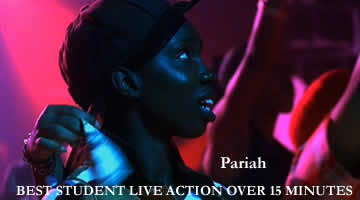 pressures placed upon her by her family, her schoolmates and her best friend, an ‘out’ butch lesbian who chides her for trying to hide her sexuality.
pressures placed upon her by her family, her schoolmates and her best friend, an ‘out’ butch lesbian who chides her for trying to hide her sexuality.
Second Place – Cricket Head (USA/South Africa), Grant Greenberg
BEST STUDENT ANIMATION:
First Place – The Needful Head (USA), Zeth Willie
Fed up with his lack of control over the things that come out of his mouth, a ghoulish character decides that the best solution is to simply get rid of it, in this twisted animated story about what can happen when you lose your head
Second Place – Windows Masks Doors (USA), Sarah Orenstein
BEST STUDENT DOCUMENTARY:
First Place – Left in Baghdad (USA), Peter Jordan, John Kane
What is everyday life like for a 32-year-old husband and father who has just been sent home from Walter Reid Medical Hospital after losing his left arm in the Iraq war? This remarkable short documentary provides some surprising answers to that question.
Second Place – Unattached (USA), J.J. Adler
KODAK AWARD FOR BEST STUDENT CINEMATOGRAPHY
First Place ($1,000 in Kodak film stock.)
Andrew McLeod (cinematographer), Pleasance (Australia)
The relationship between two brothers who reside on a farm in the remote countryside takes a subtle turn when Marie, the former lover of the younger brother, turns up at the farm to rekindle old feelings.
Second Place ($500 in Kodak film stock)
Carlos Davis Colin Calderón (cinematographer), If Eyes Can’t See (Ojos que no Van) (Mexico)
Three special awards were presented at this year’s Festival. The Alexis Award for Best Emerging Student Filmmaker went to Cricket Head (USA/South Africa) directed by Grant Greenberg. The film follows a forty-something teacher, who goes to ever-increasing lengths to win a student’s affections. The recipient will receive a Final Cut Pro package, courtesy of Apple Computer valued at $2,500. Presented by Jason Reitman’s production company Hard C Productions the The Hard C Hi Five to Lo-Fi Award for Best Low Budget Short went to Egg Love (Canada/USA) directed by Jonah Bekhor and Zach Math. The film recounts an amusing love story involving nothing more than a man, a woman and an egg.
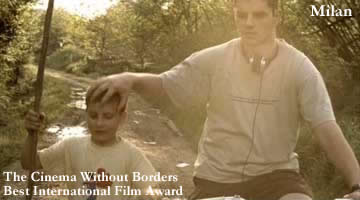 The Cinema Without Borders Bridging The Borders Award to Milan (Germany/Serbia/Montenegro) directed by Michaela Kezele, which tells the story of a family whose farm lies on the receiving end of the NATO bombing of Yugoslavia during the siege of Sarajevo.
The Cinema Without Borders Bridging The Borders Award to Milan (Germany/Serbia/Montenegro) directed by Michaela Kezele, which tells the story of a family whose farm lies on the receiving end of the NATO bombing of Yugoslavia during the siege of Sarajevo.
Jury members include John Dahl, director You Kill Me; Bijan Tehrani from Cinema Without Borders; Rebecca Winters Keegan, “Time” magazine; Kimberly Yutani, short film programmer for the Sundance Film Festival; and Amotz Zakai from Echo Lake Entertainment.
http://www.psfilmfest.org

